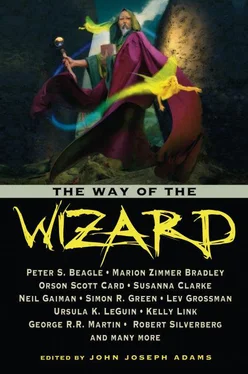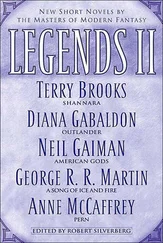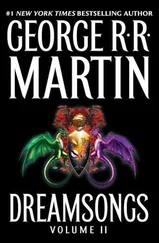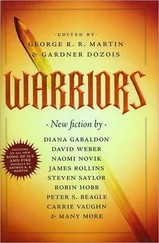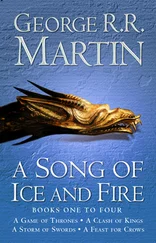“What ails you?” Emil cried, rushing to the old man’s side.
“Nothing that you can help, lad. I’ve a disease of the gut that none can cure, and my time may be short.”
Emil questioned the man about his ailment, and pulled from his pack dozens of pouches of herbs and powders. He heated water for a medicinal brew while the old man groaned and clutched his stomach.
The man pulled horrible faces as he drank down the bitter tea, but before long his pain eased, and he was able to sit upright again. Emil mixed another batch of the preparation and assured him that he would be cured if he drank the tea for seven days.
“I was wrong about you,” the man said. “You’re no shepherd.” He pulled a scroll from deep within his pack. “For your kindness I’ll give you what you’ve traveled the world seeking.”
The little man explained that the scroll contained three powerful spells, written in a language that no man had spoken in a thousand years. The first was a spell to summon a benevolent spirit, who would then guide him in his learning.
The second summoned objects from one world into another, for every child knew that there were many worlds, and that it was possible to pierce the veil between them.
The third would transport a person between worlds.
If he could decipher the three spells, he would surely become the most powerful sorcerer in the kingdom.
Emil offered the old man what coins he had, but he refused. He simply handed over the scroll, bade Emil farewell, and walked back into the forest.
Audra filled her time reading to the Mirror. The shelves were filled with hundreds of books: old and new, leather-bound and gilt-edged, or flimsy and sized to be carried in a pocket.
She devoured them, looking for clues. How she got here. How she might get back.
On a bottom shelf in the library, in the sixth book of a twelve-volume set, she found her story.
The illustrations throughout the blue, cloth-bound book were full of round, cheerful children and curling vines. She recognized some of her friends and enemies from her old life: there was Miska, who fooled the Man-With-The-Iron-Head and whom she had met once on his travels; on another page she found the fairy who brought the waterfall to the mountain, whom Audra resolved to visit as soon as she got home.
She turned the page, and her breath caught in her throat.
“The Magician and the Maid,” the title read. Beneath the illustration were those familiar words, “Once upon a time.”
A white rabbit bounded between birch trees toward Audra’s cottage. Between the tree tops a castle gleamed pink in the sunset light, the place where her story was supposed to end. Audra traced the outline of the rabbit with her finger, and then traced the two lonely shadows that followed close behind.
Two shadows: one, her own, and the other, Emil’s.
Audra was reading to the Mirror, a story it seemed to particularly like. It did tricks for her as she read, creating wispy images in the glass that matched the prose.
She had just reached the best part, where the trolls turn to stone in the light of the rising sun, when she heard footsteps outside the library door. The Mirror looked anxiously toward the sound, and then slipped out of sight beyond the carved frame.
The door burst open.
“Who are you talking to?” Miles demanded. “Who’s here?” He smelled of scotch and sweat, and his overcoat had a new stain.
“No one. I like to read aloud. I am alone here all day,” she said.
“Don’t pretend I owe you anything.” He slouched into the chair and pulled a cigarette from his coat. “You might make yourself useful,” he said. “Read to me.”
The room was small, and she stood no more than an arm’s length away, feeling like a school girl being made to recite. She opened to a story she did not know, a tale called “The Snow Queen,” and began to read. Miles closed his eyes and listened.
“Little Kay was quite blue with cold, indeed almost black, but he did not feel it; for the Snow Queen had kissed away the icy shiverings, and his heart was already a lump of ice,” she read.
She glanced down at him when she paused for breath to find him looking at her in a way that she knew all too well.
Finally, an advantage.
She let her voice falter when he ran a finger up the side of her leg, lifting her skirt a few inches above her knee.
She did not stop reading — it was working, something in him had changed as she read. Sex was a weak foothold, but it was the only one she had, and perhaps it would be a step toward getting into his mind.
“He dragged some sharp, flat pieces of ice to and fro, and placed them together in all kinds of positions, as if he wished to make something out of them. He composed many complete figures, forming different words, but there was one word he never could manage to form, although he wished it very much. It was the word ‘Eternity.’ ”
He fingered the cord tied at her waist, and tugged it gently at first, then more insistently. He leaned forward in the chair, and unfastened the last hook on her corset.
“Just at this moment it happened that little Gerda came through the great door of the castle. Cutting winds were raging around her, but she offered up a prayer and the winds sank down as if they were going to sleep; and she went on till she came to the large empty hall, and caught sight of Kay; she knew him directly; she flew to him and threw her arms round his neck, and held him fast, while she exclaimed, “Kay, dear little Kay, I have found you at last.’ ”
His fingers stopped their manipulations. His hands were still on her, the fastenings held between his fingertips.
She dared not breathe.
Whatever control she had for those few minutes was gone. She tried to reclaim it, to keep going as if nothing had happened. She even dropped a hand from the book and reached out to touch him. His hand snapped up and caught hers; he stood, pulling hard on her arm.
“Enough.” He left the room without looking back. She heard the front door slam.
Audra straightened her clothes in frustration and wondered again what had gone wrong.
It took only a moment’s thought for Audra to decide to follow him. She peered out into the street: there he was, a block away already, casting a long shadow in the lamp light on the wet pavement.
Her feet were cold and her shoes wet through by the time he finally stopped at a warehouse deep in a maze of brick complexes. He manipulated a complex series of locks on the dented and rusting steel door, and disappeared inside.
So this was where he went at night? Not to clubs and parlors as she had thought, but here, on the edge of the inhabited city, to a warehouse only notable for having all its window glass.
The windows were too high for her to see into, but a dumpster beneath one of them offered her a chance. The metal bin was slick with mist, and she slipped off it twice, but on her third try she hoisted herself on top and nervously peered through the filthy glass of the window.
In the dim light she could just make out the shape of Miles, rubbing his hands fiercely together as if to warm them, then unrolling something — paper, or parchment — spreading it out carefully in front of him on the concrete floor. He stood, and began to speak.
The room grew brighter, and a face appeared in front of him, suspended in the air — a familiar face made of dim green light; Audra could see little of it through the dirty glass. She could hear Miles’s voice, urgent and almost desperate, but the words he shouted at the thing made no sense to her.
She shifted her weight to ease the pain of her knee pressing against the metal of the dumpster, and slipped. She fell, and cried out in pain as she landed hard on the pavement. She didn’t know if Miles had heard, but she did not wait to find out. She picked herself up — now wet, filthy, and aching — and ran.
Читать дальше
